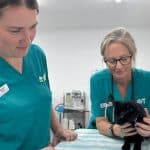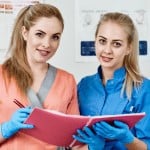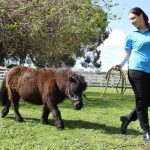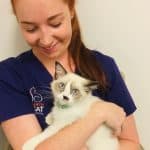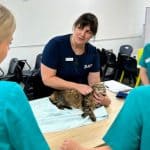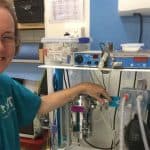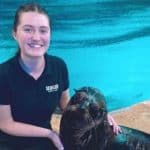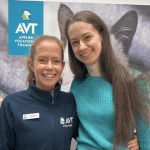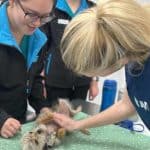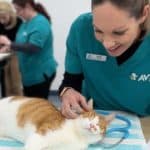Meet Cathleen Diamond, BSc RVN APVN (Zoo) CertAqVN
We’re super proud of AVT graduate Cathleen Diamond and all the amazing things she’s achieved since graduating! After completing her Certificate II in Animal Studies and Certificate IV in Veterinary Nursing online, she’s worked at some incredible places like Bondi Veterinary Hospital, Sea Life Sydney Aquarium, Wild Life Sydney Zoo, and Sea Life Sunshine Coast. In 2023, Cathleen became one of the first eight nurses in the world to earn the Aquatic Veterinary Nurse certification, showing her skills in everything from physiology and husbandry to disease treatments and animal welfare. Read her story and be inspired by her incredible journey!
What inspired you to pursue a career in animal care?
From a young age I had a love for all animals, and a passion for wildlife conservation and welfare from watching animal documentaries. This passion motivated me to complete my Bachelor of Zoology and Conservation Biology at UWA. As I was completing my degree, I wanted to build my animal handling skills, so I completed the Certificate II in Animal Studies with AVT online. Whilst completing my work placement, I fell in love with veterinary nursing so was encouraged by my clinic to complete my Certificate IV Veterinary Nursing with them. I was fortunate enough to gain employment with this clinic before fully qualifying.
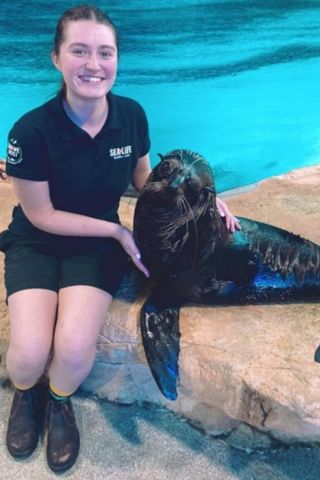
What was your background with animals prior to studying?
I had limited experience with animals prior to studying aside from owning dogs, cats, fish, rabbits and hamsters. My experience was within retail as I started as a casual customer sales assistant at 14 years old. I worked for several companies in which I always worked up to being a 2IC or manager. Retail taught me invaluable transferable skills including organisation, customer service, dispute resolution and how to work both as an effective team member and independently.
After finishing your studies, what avenues did you explore?
My goal was always to work within a zoological setting, so I saved up to move interstate to Sydney and initially worked for Bondi Veterinary Hospital. After a few months; a part time Aquatic and Australian Native Veterinary Nurse role popped up at Sea Life Sydney Aquarium and Wild Life Sydney Zoo. Having no experience in aquatics or native animals, I was not confident I would get the role, but the skills that I had gained throughout my retail roles and veterinary nursing combined with my passion for learning secured the position. Within three months I stepped up to the Head Nurse role as a maternity cover for seven months and was responsible for coordinating all animal health across both sites. This was a steep learning curve but changed my mind set from “hesitating that I could do something” to “okay what needs to be done and let’s do it”. Whilst at the zoo, I completed the Certificate of Zoo Veterinary Nursing with Girling and Fraser.
“In 2023 the World Aquatic Veterinary Medical Association created a certification to certify Aquatic Veterinary Nurses. This process took about a year in which I had to demonstrate my expertise over 8 subject matters ranging from physiology, husbandry, life support systems, disease treatments and animal welfare.
I am proud to be one of the first 8 nurses in the world to receive this certification and am now a mentor for any nurses wishing to complete the certification.”
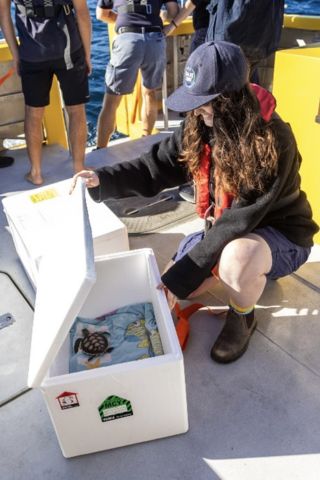
How did you become an Aquatic Veterinary Nurse (AqVN) at Sea Life?
After a couple of years in Sydney, I felt like a sea change and a veterinary nurse role was available at Sea Life Sunshine Coast, so I made the move north. At Sunny Coast I oversee the animal health for all our teleosts, cephalopods, rescue marine turtles, various reptiles, elasmobranchs, little penguins and our seal and sea-lion population.
In 2023 the World Aquatic Veterinary Medical Association created a certification to certify Aquatic Veterinary Nurses. This process took about a year in which I had to demonstrate my expertise over eight subject matters ranging from physiology, husbandry, life support systems, disease treatments and animal welfare. I am proud to be one of the first eight nurses in the world to receive this certification and am now a mentor for any nurses wishing to complete the certification.
What is a typical day like at Sea Life?
My days vary depending on the case load, but my role encompasses a wide variety of tasks. Unlike a general practice veterinary clinic, we only have a veterinarian onsite once a week.
Veterinarian Coordination:
- Responsible for collating medical cases.
- Manage the veterinarian’s weekly visit to ensure all necessary procedures and case reviews are completed.
- Daily liaison with the veterinarian to report new cases.
Communication and Coordination:
- Coordinate medical treatments with the curator and aquarists.
Medication Management:
- Dispense medications and manage records to ensure correct dosages.
- Track everything to comply with legislation.
Staff Training:
- Train staff to administer medications to a wide range of taxa.
Diagnostics:
- Perform skin scrapes, gill clips, or faecals to assess parasite loads.
- Conduct blood tests on sea turtles to indicate dehydration and overall health status.
- Perform water quality tests to assess the health of the aquatic environment.
- Conduct necropsies to determine causes of death.
Preventative Health Care:
- Conduct regular body condition scoring and quality of life assessments.
- Perform regular health checks, including blood analysis.
Can you share a rewarding experience from your time working at Sea Life?
My proudest achievement so far was organising and assisting with a dental procedure for a 400kg Saltwater Crocodile at Wild Life Sydney. This process took three months of planning with a small team of specialised keepers and veterinarians, and I was responsible for all the co-ordination leading up to and on the day. Performing a dental procedure on such a large and potentially dangerous animal requires a lot of prior assessment and required our team to consider all possibilities that could occur which I then collated into a 12-page Standard Operating Procedure.
Another rewarding time was assisting with the hatching of a little penguin chick and then providing tube feeds to support her first couple of days, she is now a beautiful thriving adult within our population at Sea Life Sunshine Coast.
How did your Animal Care and Veterinary Nursing qualifications prepare you for the workforce?
The Veterinary Nursing qualification provided me the important fundamental knowledge on medical, surgical and clinical nursing skills which was the critical baseline that I could then apply to any new species I was required to work with. Veterinary Nursing provides key organisational skills which are crucial for any animal care industry where we are required and entrusted to provide the best animal welfare daily. Another unexpected but important skill is the ability to learn and adapt to use multiple types of veterinary software, which now allows me to quickly pick up any new computer program.
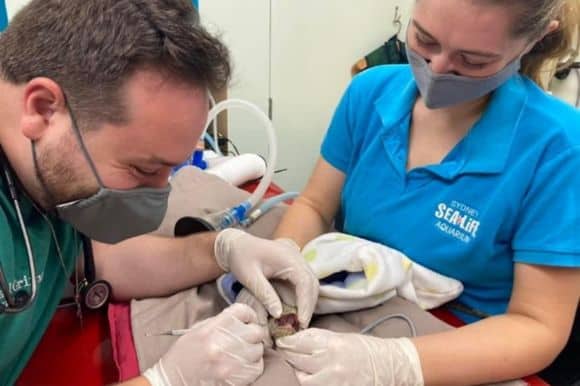
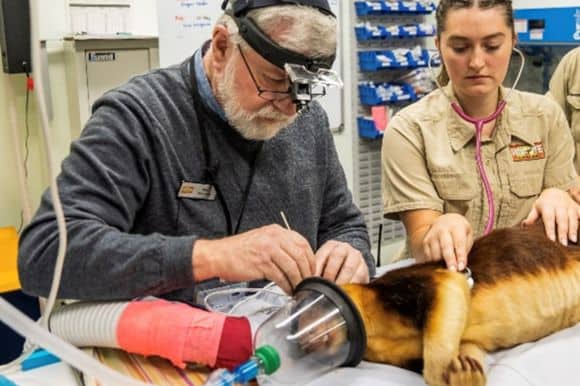
What advice would you give someone considering a career in animal care?
My advice is to pursue it! Working with animals is so rewarding but at times emotionally challenging however you do not necessarily have to work in a hands-on role with animals to make an impact. Gain knowledge wherever it is accessible via podcasts, documentaries, qualifications or certifications. Reach out to those in the industry to find out how they got there, what their roles consist of and what their expertise is – inspiration is everywhere.
Volunteer! This is the best way to find out what role you’d like to do, and you might end up being surprised like I was – you never know if you don’t try. And always remember that there are a thousand ways to get to the career you want, it’s not always the stereotypical path that we are taught in high school which is to go to uni and then find a job.
What are your future goals?
I am still very much at the start of my career and have only just scraped the surface of Aquatic and Zoo nursing, so I am keen to pursue this further with one day becoming a specialised nurse in one or two species. I have always been passionate about wildlife conservation, and I am very fortunate to be contributing to Sea Life’s Sea Turtle Rescue and Rehabilitation and I would like to participate in more conservation projects in the future. I am currently studying the Certificate IV in Animal Behaviour and Training so will also look to incorporate that into my current and future roles.
Find out more about Veterinary Nursing
How Tracy became the Shelter Support Officer at RSPCA WA
Meet Tracy Brownell, a former stay-at-home mum who became the Shelter Support Officer at RSPCA WA. Discover how her journey with AVT's Certificate IV in Vet Nursing transformed her career and life, inspiring her to become a key figure in animal care and volunteer coordination.Inspiring Veterinary Nurses: Cathleen from student to Aquatic Veterinary Nurse
Meet Aquatic Vet Nurse, Cathleen. She studied Animal Care and Veterinary Nursing with AVT. Now she's one of the first 8 nurses in the world to receive certification in Aquatic Veterinary Nursing.Inspiring Veterinary Nurses: Teleah from student to Emergency Vet Nurse
Teleah's passion for animals, hands-on experience, and dedication to learning have driven her successful career as an Emergency Veterinary Nurse at Perth Vet Emergency.Unleash your Passion: A Guide to our top 7 Veterinary Nurse Specialisations and Training Opportunities
We explore the diverse career pathways available to veterinary nurses, highlighting a range of specialty areas such as emergency and critical care, surgical nursing, diagnostic imaging, exotic pet medicine and more.From Animal Care to Veterinary Nursing: Kristy’s Experience
Hear Kristy’s journey from the Certificate II in Animal Care (Vet Nurse Pathway) course to studying the Certificate IV in Veterinary Nursing.
Want to learn more? Read more posts about Veterinary Nursing here
Courses you may like
On-Site Intensive
ACM20121 Certificate II in Animal Care (Vet Nursing Pathway)
About Vet Nurse Pathway
Vet Nursing Pathway
Online & On-campus
ACM40418 Certificate IV in Veterinary Nursing
About Vet Nursing
